- Home
- E. M. Foner
Review Night on Union Station (EarthCent Ambassador Book 11) Page 3
Review Night on Union Station (EarthCent Ambassador Book 11) Read online
Page 3
“I really don’t know,” Clive admitted. “The ambassadors have tried teasing some answers out of Stryx librarians on several stations without success, and Jeeves ignored my invitation to attend this meeting. I sent an information request to our colleagues in Drazen Intelligence asking about their own review, but it happened around a half a million years ago and their records don’t go back that far.”
“Does anybody really believe that the Stryx will modify their conclusions based on input from the other species?” Thomas inquired skeptically. “I’m the last sentient who is going to criticize how the Stryx go about their business, but they aren’t exactly running a democracy. Clive wouldn’t have pulled his back lifting that puppy if the Stryx hadn’t sent Brinda to the Cayl as a hostage along with you two,” he made a gesture that took in Lynx and Woojin, “while they were manipulating the emperor into preserving his empire.”
“New rule,” Clive groaned. “No using ‘back’ and ‘puppy’ in the same sentence. And you’re probably right about the alien input being for show, but we have to make an effort to help the diplomatic branch when they put in a request. Does anybody have any ideas?”
“Go see the Farling,” Woojin repeated. “He has a medical shop on the travel concourse. You’ll be back to lifting puppies in no time.”
Clive turned his head to give the spy agency’s strategic planner the evil eye, but he froze midway as a new spasm hit.
“Actually, I do have one suggestion,” Walter said. “I’m sure you all remember that I have a background in political science and that I dabbled a little in electoral politics when I first came to the station. In the last century before the Stryx opened Earth and, uh, deemphasized national governments, candidates for high office often staged confrontational debates.”
“So you see humanity as a candidate for higher status on the tunnel network and the advanced species as debate opponents?” Lynx surmised. “That’s an interesting analogy.”
“I wasn’t making an analogy,” Walter replied impatiently. “The point is that the candidates prepared themselves for these events by staging practice debates, with advisers playing the roles of their opponents. If EarthCent Intelligence can work up a series of objections that each species is likely to raise, we could distribute a list to the ambassadors and they could practice rebutting the accusations with their staff.”
“I like it,” Clive said, relieved that they had come up with something that would bring the meeting closer to an end. “I’ll run it by Blythe later. I mean, I’ll tell her that’s what we’ve decided.”
“Maybe we could use some of the alien actors we’ve hired for the training camp to play the parts of the alien ambassadors for Kelly,” Woojin suggested.
“Excellent idea,” Walter concurred. “I’ve read that those practice debates worked best when staged in a manner to make them as close to the real experience as possible.” He rose from his chair, touched his toes, and stretched ostentatiously. “Well, unless you need me to lift something, I’ve got a newspaper to run while my boss is out on maternity leave.”
Nobody objected, and Walter absented himself from the meeting room. Woojin got up to make his wife a cup of decaf tea, and Thomas issued a silent command that caused a schedule for the training camp in Mac’s Bones to appear on the wall-sized conference room display. The tip of one of his pinkies lit up with a laser on low intensity, and he used it to point out the organizational chart of facial images that appeared in the “staffing” section.
“What’s this?” Lynx asked.
“Joe has put in for retirement,” the artificial person replied. “Aisha bought Paul an alien ship graveyard for their anniversary and Joe is going to join him full-time in the salvage business.”
“Does anybody have an idea how much she paid?” Woojin asked out of curiosity.
“It’s public information,” Clive said. “I forget the exact figure, but after Blythe got it from Libby, she commented that she knew Aisha was wealthy, but she didn’t know she was that wealthy.”
“Getting back to the subject at hand, Joe said that eventually he may have to kick us out of the hold to make room,” Thomas informed them.
“Make room? But Mac’s Bones is huge,” Lynx objected.
“And Paul now owns hundreds of alien spacecraft, many of which they’ll want to bring into Mac’s Bones to save on commuting out to the parking orbit. Some jobs are easier in Zero-G, but for the main part, humans work better when they weigh something, not to mention having an atmosphere and other health benefits,” Thomas said. “The hold won’t fill up tomorrow or next cycle, but keep it in mind.”
“Judith is taking his place?” Woojin asked, looking at the faces on the screen. “She’s getting better with that rapier, but we don’t teach fencing to the trainees and I don’t remember her rating in hand-to-hand combat.”
“I recently integrated a Jujitsu master upgrade from QuickU and I’ve been teaching her,” Thomas informed them. “She’ll do fine as long as she remembers that it’s training and not combat. Chance is testing a Vergallian martial arts upgrade from QuickU herself, so she can always cover if Judith or I need help.”
“If you can get Chance to show up in the morning,” Lynx said. “Have the two of you sparred?”
Thomas gave her a sour look. “I’ll just say we don’t want to go to war with the Vergallians anytime soon.”
“If that’s everything, I’ll—ohhh!” Clive groaned. “When did I become such a wimp?”
“Must be the first time you’ve put your back out,” Woojin said sympathetically. “It’s a bit of a shock, isn’t it? Happened to me right before a cavalry raid, and all I did was to bend over to buckle my boots. Even loaded on pain-killers and muscle relaxants I couldn’t have mounted that horse to save my life.”
“Go to the beetle,” Lynx told her boss. “Everybody knows you’re a tough guy. You’re just getting older.”
“I’ll walk you down there,” Woojin offered. “You look like you might not make it on your own.”
“I may not make it out of this chair on my own,” Clive admitted. He leaned on the conference table and slowly gained his feet, though he froze like a statue more than once during the process. “Have you talked to Judith about eventually taking over so you can go back into the field?” he asked Thomas.
“Yes,” the artificial person replied, moving alongside Clive, who shuffled slowly out of the EarthCent Intelligence conference room. “She said she was suspicious when you put her through the analyst training program and then never got around to assigning her a new mission after the McAllisters returned from Earth.”
“It was my wife’s idea,” Clive said. “She believes in cross-training employees who show executive ability. Blythe also said that Judith would never make it as an analyst because she’s too action-oriented, but she understands the work, and that will help her advise trainees in their career options.”
“Let’s go,” Woojin said, guiding his boss towards a lift tube as they exited EarthCent Intelligence headquarters. “See you at home, Lynx. And I’ll stop by the training camp later to discuss the changes, Thomas.”
Clive braced himself for the inevitable acceleration as the lift tube capsule started off, which was a mistake since his back didn’t need any encouragement to go into a fresh spasm. When they arrived on the travel concourse, he could barely bend his knees to start walking, and Woojin offered him an arm for support.
“Nuts to that,” the younger man hissed through clenched teeth. “I’m not a basket case yet.”
“The Farling’s medical practice is just over there, between the Vergallian luggage shop and the Grenouthian entertainment boutique.”
“Are you sure he’s open?”
“I don’t think the beetles sleep,” Woojin replied. “I know he takes shifts from the Stryx as the emergency all-species doctor, and that they brought him to the station on a special contract. But he’s always been here when I pop in to get Lynx her vitamins, and there’s no way the Farling clo
ck is running the same length day as ours.”
“Lynx seemed pretty quiet today,” Clive observed. “I know that Blythe offered to let her take the third trimester as paid leave, but your wife said that she was pregnant, not sick.”
“She wouldn’t know what to do with herself at home.” Woojin moved quickly to interpose himself between his slowly shuffling companion and a young Horten who was obviously playing a game on a heads-up display and not watching where he was going. “Sometimes I think she would have been happier in the diplomatic branch. She enjoys the cultural attaché cover job more than intelligence work.”
“Is this it?” Clive asked, eyeing the narrow entry between the luggage shop and the immersives outlet. “What’s with all the stuff on the walls?”
“Sensors,” Woojin explained. “The Farling scans everybody who enters his shop to cut down on diagnostic time. His bedside manner could use a little…”
“Lynx’s seed donor and companion,” the giant beetle greeted them, cutting off Woojin’s explanation. “You’ve put on weight, Mr. Lynx, which you’ll probably have trouble losing at your advanced age.”
Woojin reflexively moved his hands to his waistline, and then jerked them away as if he had been burned. “Clive Oxford, this is Doctor M79, er, something. I’ve got to run.” Without waiting for a response, he slipped out the door and broke into a jog, one hand on his gut.
“So, uh,” Clive began, but the giant insect interrupted him.
“I see somebody has been lifting things he shouldn’t,” the Farling observed. “Stand over there and I’ll take a blood sample. We’ll have you fixed up in no time.”
Clive shuffled stiffly over toward the oddly equipped operating table the doctor had indicated and extended an arm for the beetle to draw a blood sample. Instead, the Farling pressed something that looked like a glass gun against his patient’s neck. The device made a “pffft” sound, and although Clive didn’t feel anything, he saw that the thin tubular section above the trigger was now full of blood. The doctor skittered over to a device that looked a bit like a vending machine, injected the gun barrel into a port, and the blood vanished from the tube.
“Alright, while that’s cooking, let’s see about your ruptured disc.”
“Ruptured? Is that bad?”
“It would be a tragic injury if your species was carefully designed from high-grade organic structural elements, but given the crudity of your body, I think a little quick-drying glue will do the job nicely.”
“Huh?”
“Up on the table, now. Don’t be a baby. Oh, here,” the Farling said in exasperation after watching Clive’s ineffectual attempts to lever himself up. Eight insectoid appendages took hold of the intelligence director, lifting the large man and depositing him face down on the table as if he were a child.
“It’s traditional for the doctor to tell the patient what he’s doing,” Clive gritted out.
“Really?” the Farling asked, pulling Clive’s shirt out of his trousers and pushing it up to the patient’s shoulder blades. “Then to put it in terms you might understand, I’m repairing your boo-boo. I could do it with you lying on your back, but then I’d have to move all of your digestive plumbing out of the way, which isn’t as much fun for me as you might think. Huh. I’ve never seen so much vestigial fur on a human. One can easily picture you with a tail swinging through the trees.”
“It’s not fur, it’s hair, and I’m not that bad.”
“It’s in the way, so off it comes,” the beetle buzzed, using a specialized set of forelegs to produce the alien language translated by Clive’s implant. In rapid succession, the doctor sprayed the man’s back with white foam that looked like shaving cream, flashed it with an ultraviolet lamp, and then casually pulled the instantly solidified mass away and tossed it in the medical waste bin.
“What was that? I felt something.”
“Just relax,” the doctor continued, prodding up and down Clive’s spine. “Hmm. Maybe we can avoid cutting you open after all.”
“You just shaved my back and now you’re not going to operate?”
“Your wife will thank me,” the Farling retorted, retrieving a device that looked like an enormous stainless steel spider from an antiseptic bath. He placed it on Clive, where a number of the oddly jointed over-sized needles that looked like spider’s legs immediately sank into the patient’s flesh. A holographic representation of the lower part of Clive’s spine sprang to life over the table, and the doctor began manipulating the spider’s various surgical attachments through an embedded interface that allowed him to control the equipment telepathically.
“Did you just give me some kind of local anesthetic?” Clive asked. “I can barely feel a thing.”
“Finished,” the Farling declared, retrieving the spider from the man’s back and casually dumping it into the disinfectant bath. “Did you want to feel pain? I’m sure I can locate a more sensitive spot to give you a jab.”
“No,” Clive said, gingerly rolling onto his side and then swinging his legs off the table. “Hey, I feel good!”
“Why do you say that like you’re surprised? Then again, based on all of the signs of old blunt-force traumas my scan picked up when you entered, I assume you’ve had sufficient experiences with Human medical personnel to put you off the profession.”
“I spent a year as a cage-fighter when I finished my mercenary hitch. But I never broke anything so I stayed away from the docs.”
“I wagered on a number of Human cage-fighting matches during my last visit to the tunnel network,” the beetle commented. He watched Clive closely as the man swung his arms and twisted from side to side. “I stopped when I realized that the combatants were actually sentient, albeit in a limited way, and therefore capable of rigging the outcome. Now touch your toes.”
“Come again?” Clive asked, unsure whether to be more offended by the doctor’s critique of human intelligence or the aspersions cast on the integrity of cage-fighting, though he touched his toes all the same.
“That’s my line to departing customers, without the interrogative at the end. Hmm. There’s still something a little out of whack with your spine. I suppose it’s my fault for restoring you to perfect symmetry rather than your original flawed state. Stand up straight with your back to me and push your elbows as far behind you as they’ll go.”
Clive followed the instructions even as he struggled to process the Farling’s stream of barely veiled insults. He felt a pair of the insect’s appendages hooking around his elbows and a hard, rounded surface pressed against his back. Then the doctor leaned forward, lifting Clive’s feet off the ground and causing the human’s body to drape over the beetle’s curved carapace. A few muffled cracking sounds followed as the discs realigned, and then the alien straightened out, restoring Clive to his feet.
“Touch your toes,” the doctor ordered again.
Clive shook his head at the Farling’s lack of manners, but he felt so good that he complied, and this time his back moved more smoothly than it had in years.
“Another fine job,” the alien complimented himself. “Will you be paying cash or should I bill your better half?”
“I’ll—how much is it?”
“Shall we say, fifty creds for repairing the disc and a hundred for removing that disgusting fur?”
“Do you have a register?” Clive asked, producing his programmable cred. Whatever the alien’s problem was, the director of EarthCent Intelligence didn’t see the point of rising to the bait.
“It’s built into the genetic analyzer to save room,” the doctor said, indicating the machine into which he had earlier deposited Clive’s blood. “Speaking of which, your sample should be done by now.”
“Why did you need to examine my genes?” Clive asked, passing over the coin.
“Just a hobby of mine,” the Farling replied absently, slipping the programmable cred into a slot and keying in the amount. “I have an interest in primitive evolutionary biology.”
“Autho
rized,” Clive confirmed for the register when the correct figure appeared floating in space. The Farling removed the coin and made a small gesture, which brought up a hologram of a colorful double-helix in the space the register display had previously occupied.
“That’s odd,” the Farling remarked, looking over at Clive and then back at the display. “I treated your sister earlier today.”
“You must mean my sister-in-law,” the man said. “My wife, Blythe, is Chastity’s sister. She’s expecting today, at least according to your countdown watch.”
“Then she will deliver today,” the doctor said confidently, “but I was talking about your younger sibling.”
“I don’t have any siblings,” Clive said, a sudden chill running up his repaired spine. “I’m an orphan.”
“As much as I hesitate to question the medical expertise of an ex-mercenary and cage-fighter, your genetic structure is too simple for there to be any mistake.”
“That’s impossible. I was orphaned as a child and raised by a Vergallian trader.”
“Would you be willing to place a small wager on my analysis?” the Farling asked, his multifaceted eyes taking on a bright gleam.
“Whatever you like,” Clive answered almost angrily. “Where is she?”
“Somewhere on the station, no doubt. I’m sure the Stryx librarian could give you her precise location. She and her son will have to return to my office two more times to complete their treatment for radiation poisoning. Shall we make it a hundred creds?”
“Done,” Clive said, trying to regain the feeling of being in control for the first time since entering the alien’s shop. “Libby? Can you tell me where the Farling doctor’s human patients from this morning are? A woman…” he stopped and motioned for the giant beetle to continue.
“Clive’s sister and nephew. Gryph is paying their bill.”
“You mean the survivors from the ship that was retrieved from the obsolete Verlock rescue network,” Libby responded. “I thought the boy looked familiar. I have them booked into suites in our itinerant medical hostel.”

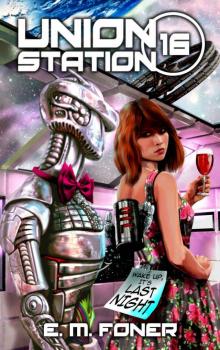 Last Night on Union Station (EarthCent Ambassador Book 16)
Last Night on Union Station (EarthCent Ambassador Book 16)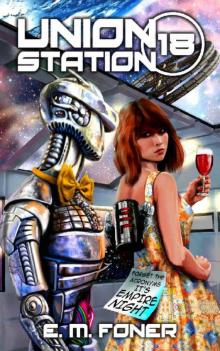 Empire Night on Union Station (EarthCent Ambassador Book 18)
Empire Night on Union Station (EarthCent Ambassador Book 18)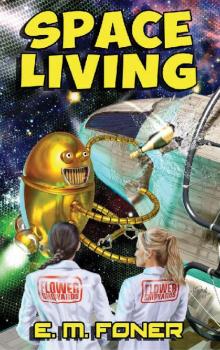 Space Living (EarthCent Universe Book 4)
Space Living (EarthCent Universe Book 4)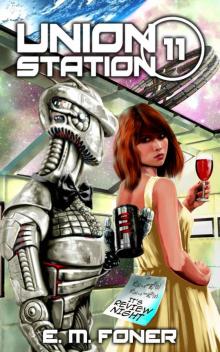 Review Night on Union Station (EarthCent Ambassador Book 11)
Review Night on Union Station (EarthCent Ambassador Book 11)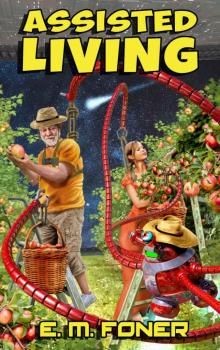 Assisted Living
Assisted Living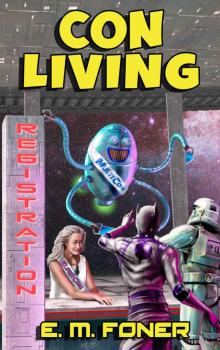 Con Living
Con Living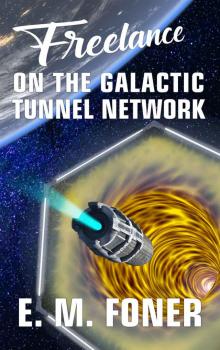 Freelance On The Galactic Tunnel Network
Freelance On The Galactic Tunnel Network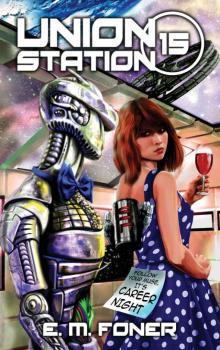 Career Night on Union Station
Career Night on Union Station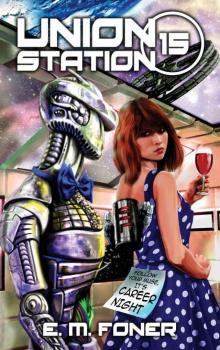 Career Night on Union Station (EarthCent Ambassador Book 15)
Career Night on Union Station (EarthCent Ambassador Book 15)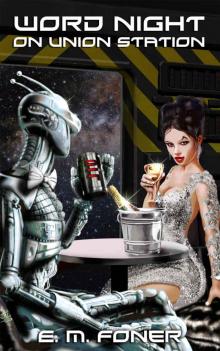 Word Night on Union Station (EarthCent Ambassador Book 9)
Word Night on Union Station (EarthCent Ambassador Book 9)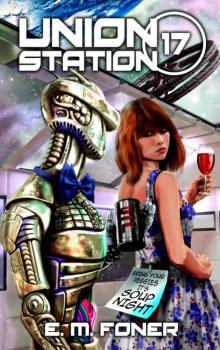 Soup Night on Union Station
Soup Night on Union Station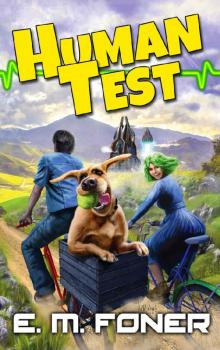 Human Test
Human Test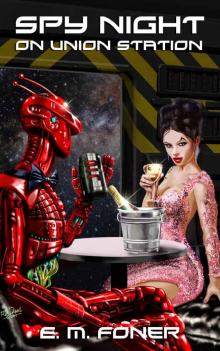 Spy Night on Union Station (EarthCent Ambassador Book 4)
Spy Night on Union Station (EarthCent Ambassador Book 4)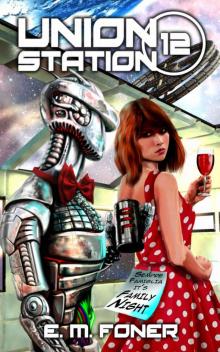 Family Night on Union Station (EarthCent Ambassador Book 12)
Family Night on Union Station (EarthCent Ambassador Book 12) Party Night on Union Station (EarthCent Ambassador Book 10)
Party Night on Union Station (EarthCent Ambassador Book 10)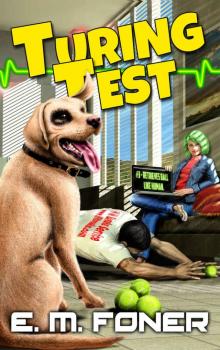 Turing Test
Turing Test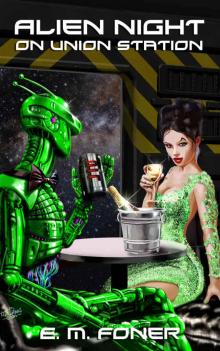 Alien Night on Union Station (EarthCent Ambassador Book 2)
Alien Night on Union Station (EarthCent Ambassador Book 2)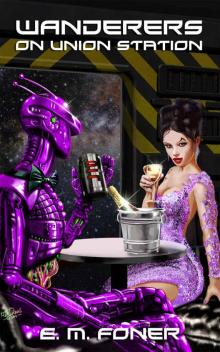 Wanderers On Union Station (EarthCent Ambassador Book 6)
Wanderers On Union Station (EarthCent Ambassador Book 6)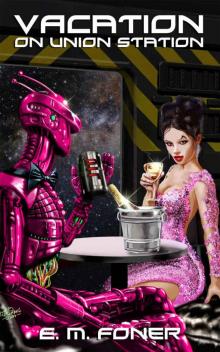 Vacation on Union Station (EarthCent Ambassador Book 7)
Vacation on Union Station (EarthCent Ambassador Book 7)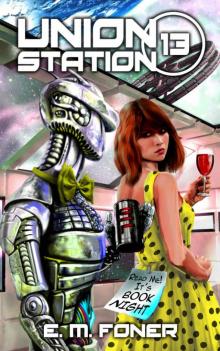 Book Night on Union Station (EarthCent Ambassasor 13)
Book Night on Union Station (EarthCent Ambassasor 13)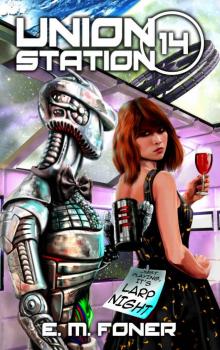 LARP Night on Union Station
LARP Night on Union Station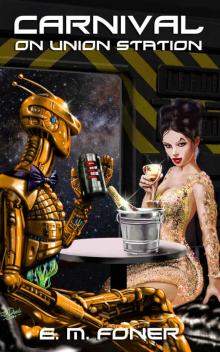 Carnival On Union Station (EarthCent Ambassador Book 5)
Carnival On Union Station (EarthCent Ambassador Book 5)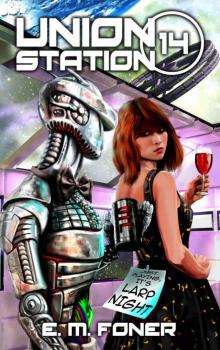 LARP Night on Union Station (EarthCent Ambassador Book 14)
LARP Night on Union Station (EarthCent Ambassador Book 14)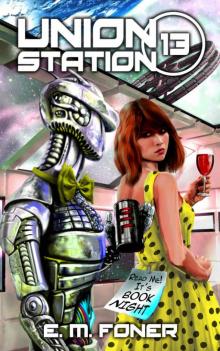 Book Night on Union Station
Book Night on Union Station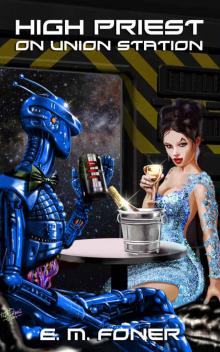 High Priest on Union Station (EarthCent Ambassador Book 3)
High Priest on Union Station (EarthCent Ambassador Book 3)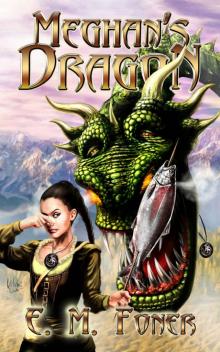 Meghan's Dragon
Meghan's Dragon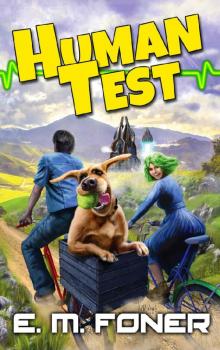 Human Test (AI Diaries Book 2)
Human Test (AI Diaries Book 2)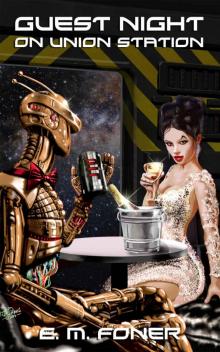 Guest Night on Union Station
Guest Night on Union Station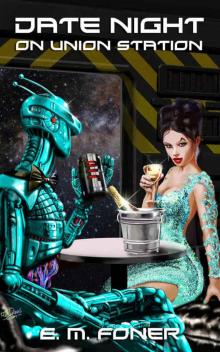 Date Night on Union Station
Date Night on Union Station